Abstract
Not keeping scheduled visits for medical care is a major health care issue. Little research has addressed how the interaction of demographic and biomedical parameters with psychosocial processes has an impact on appointment keeping. Typical factors are stress of daily living, methods of coping, social support, and instrumental support (that is, tangible assistance). In this study, the authors examine the role of these parameters and processes in the risk status for dropping out of a developmental followup program for very low birth weight infants. The findings suggest that the stress of daily living is a significant predictor for the mother's return when the infant is 6 months of age (corrected for prematurity). The predictors for return at 24 months corrected age include marital status, race, gestational age of the infant, maternal intelligence, and efficacy expectations. Providing transportation was found to be a successful intervention strategy for a subgroup at very high risk for dropping out due to a constellation of biomedical, demographic, and psychosocial factors.
Full text
PDF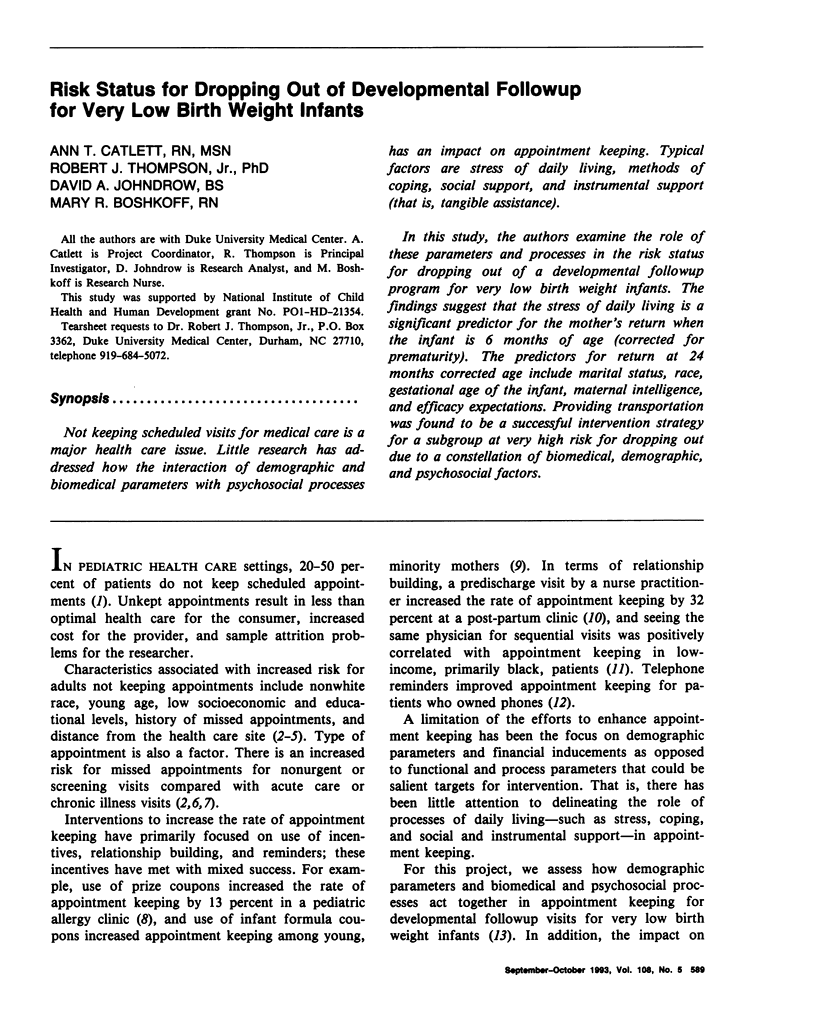
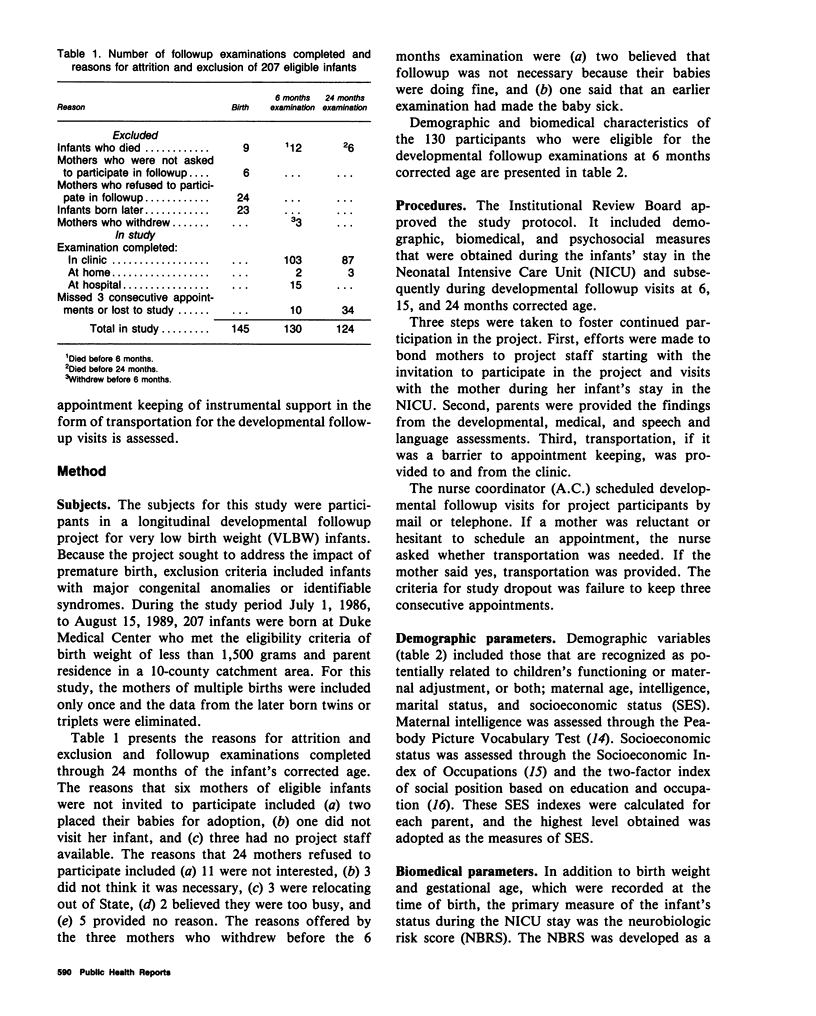
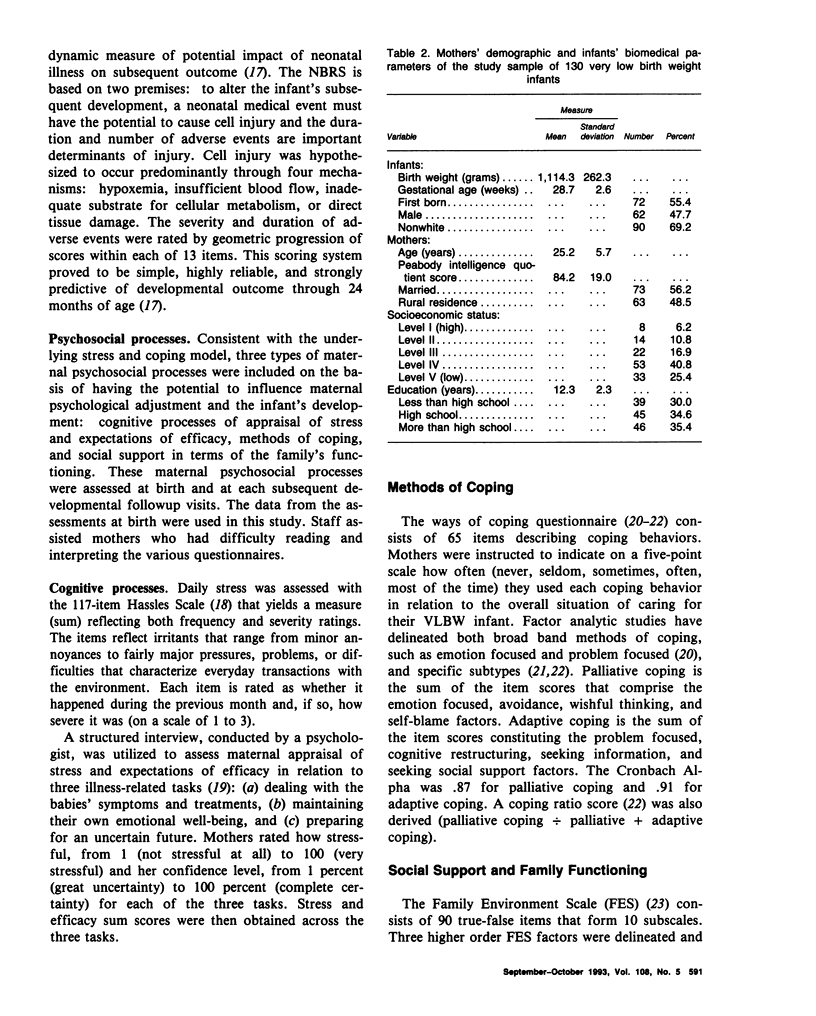
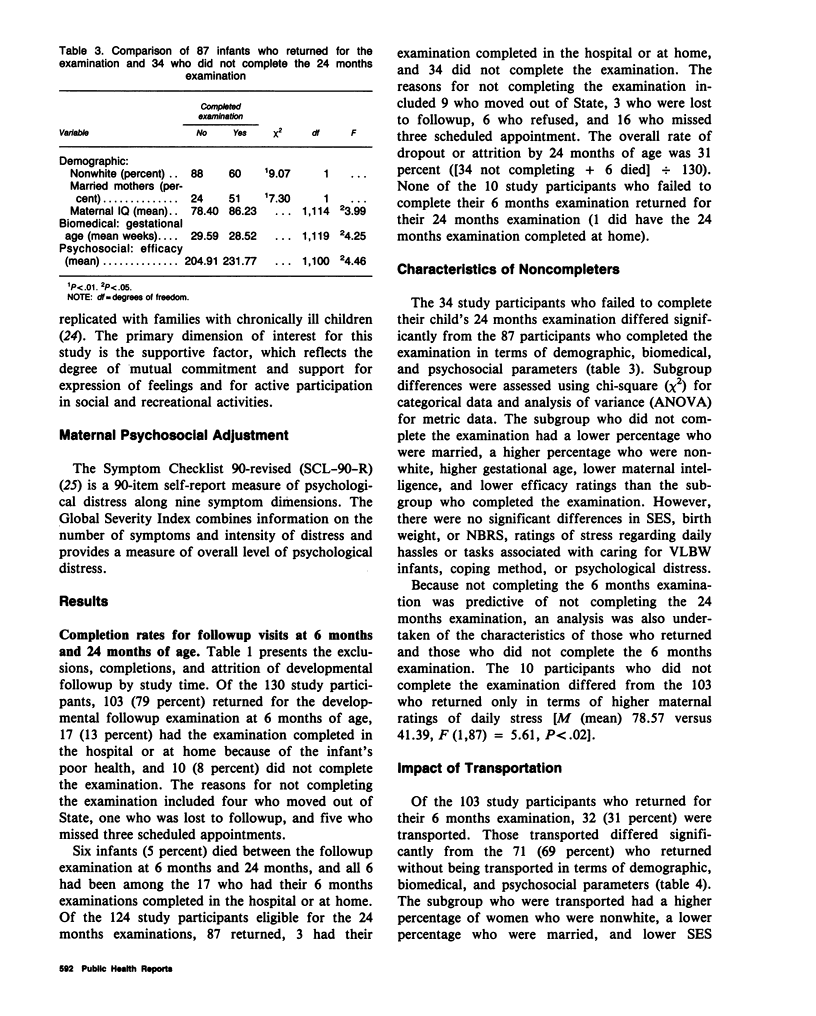
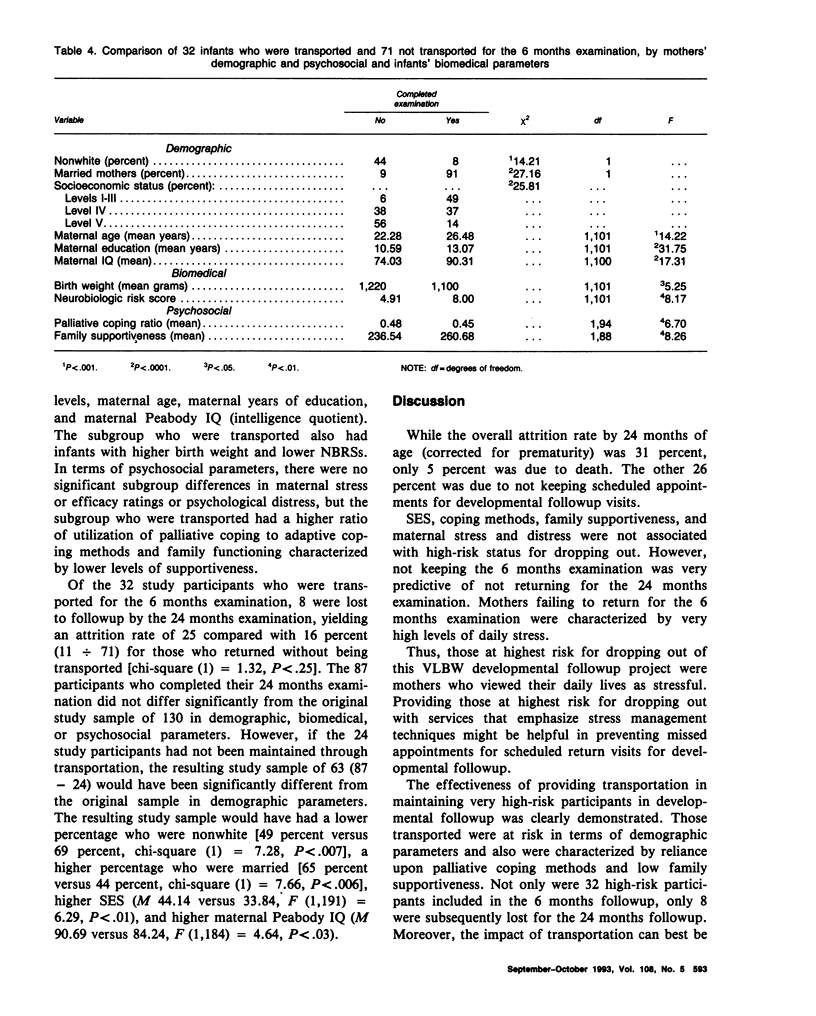
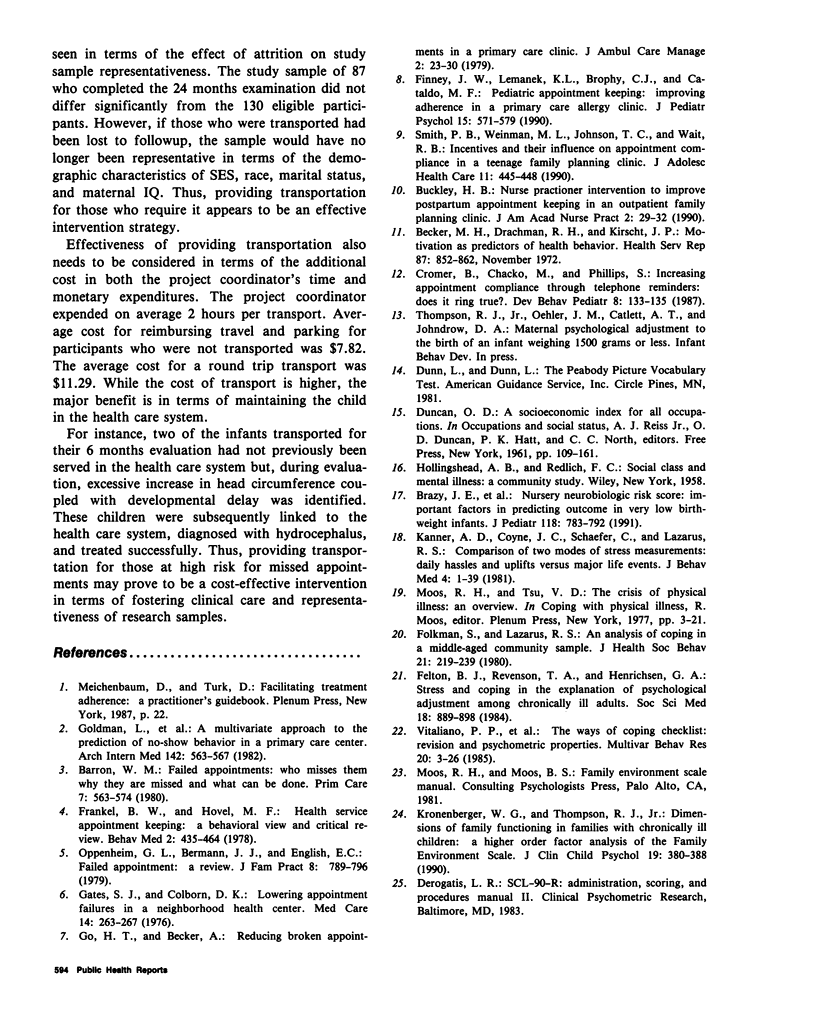
Selected References
These references are in PubMed. This may not be the complete list of references from this article.
- Barron W. M. Failed appointments. Who misses them, why they are missed, and what can be done. Prim Care. 1980 Dec;7(4):563–574. [PubMed] [Google Scholar]
- Becker M. H., Drachman R. H., Kirscht J. P. Motivations as predictors of health behavior. Health Serv Rep. 1972 Nov;87(9):852–862. [PMC free article] [PubMed] [Google Scholar]
- Brazy J. E., Eckerman C. O., Oehler J. M., Goldstein R. F., O'Rand A. M. Nursery Neurobiologic Risk Score: important factor in predicting outcome in very low birth weight infants. J Pediatr. 1991 May;118(5):783–792. doi: 10.1016/s0022-3476(05)80047-2. [DOI] [PubMed] [Google Scholar]
- Buckley H. B. Nurse practitioner intervention to improve postpartum appointment keeping in an outpatient family planning clinic. J Am Acad Nurse Pract. 1990 Jan-Mar;2(1):29–32. doi: 10.1111/j.1745-7599.1990.tb00769.x. [DOI] [PubMed] [Google Scholar]
- Cromer B., Chacko M., Phillips S. Increasing appointment compliance through telephone reminders: does it ring true? J Dev Behav Pediatr. 1987 Jun;8(3):133–135. [PubMed] [Google Scholar]
- Felton B. J., Revenson T. A., Hinrichsen G. A. Stress and coping in the explanation of psychological adjustment among chronically ill adults. Soc Sci Med. 1984;18(10):889–898. doi: 10.1016/0277-9536(84)90158-8. [DOI] [PubMed] [Google Scholar]
- Finney J. W., Lemanek K. L., Brophy C. J., Cataldo M. F. Pediatric appointment keeping: improving adherence in a primary care allergy clinic. J Pediatr Psychol. 1990 Aug;15(4):571–579. doi: 10.1093/jpepsy/15.4.571. [DOI] [PubMed] [Google Scholar]
- Folkman S., Lazarus R. S. An analysis of coping in a middle-aged community sample. J Health Soc Behav. 1980 Sep;21(3):219–239. [PubMed] [Google Scholar]
- Gates S. J., Colborn D. K. Lowering appointment failures in a neighborhood health center. Med Care. 1976 Mar;14(3):263–267. doi: 10.1097/00005650-197603000-00007. [DOI] [PubMed] [Google Scholar]
- Go H. T., Becker A. Reducing broken appointments in a primary care clinic. J Ambul Care Manage. 1979 May;2(2):23–30. doi: 10.1097/00004479-197905000-00005. [DOI] [PubMed] [Google Scholar]
- Goldman L., Freidin R., Cook E. F., Eigner J., Grich P. A multivariate approach to the prediction of no-show behavior in a primary care center. Arch Intern Med. 1982 Mar;142(3):563–567. [PubMed] [Google Scholar]
- Kanner A. D., Coyne J. C., Schaefer C., Lazarus R. S. Comparison of two modes of stress measurement: daily hassles and uplifts versus major life events. J Behav Med. 1981 Mar;4(1):1–39. doi: 10.1007/BF00844845. [DOI] [PubMed] [Google Scholar]
- Oppenheim G. L., Bergman J. J., English E. C. Failed appointments: a review. J Fam Pract. 1979 Apr;8(4):789–796. [PubMed] [Google Scholar]
- Smith P. B., Weinman M. L., Johnson T. C., Wait R. B. Incentives and their influence on appointment compliance in a teenage family-planning clinic. J Adolesc Health Care. 1990 Sep;11(5):445–448. doi: 10.1016/0197-0070(90)90093-h. [DOI] [PubMed] [Google Scholar]


